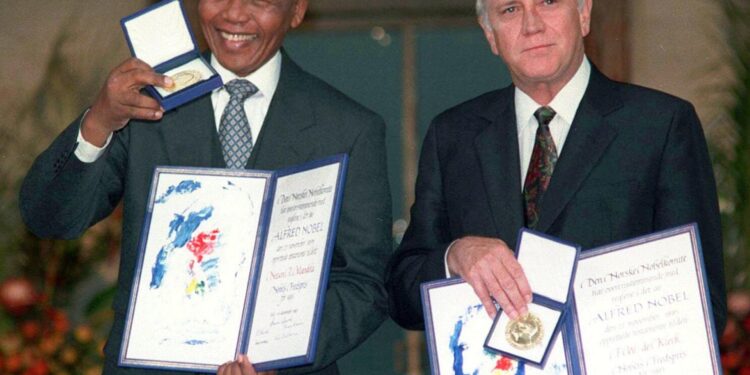In a momentous recognition of their efforts to dismantle apartheid and usher in a new era of democracy in South Africa, Nelson Mandela and F.W. de Klerk were jointly awarded the Nobel Peace Prize in 1993. This prestigious accolade celebrated their remarkable journey from adversaries to partners in peace, symbolizing hope for a nation long divided by racial segregation.
Nelson Mandela, the iconic anti-apartheid leader, spent 27 years in prison for his fight against racial oppression. His unwavering commitment to equality and reconciliation, even after his release in 1990, set the stage for a peaceful transition in South Africa. Mandela’s vision of a “rainbow nation” and his ability to forgive his former oppressors became a powerful force for unity.
F.W. de Klerk, as the last president of apartheid-era South Africa, took the bold and controversial step of unbanning anti-apartheid organizations and releasing political prisoners, including Mandela. His decision to negotiate the end of white minority rule marked a pivotal moment in South African history and demonstrated remarkable political courage.
The Nobel Committee’s decision to honor both men jointly was a testament to their shared commitment to peaceful change. It recognized the delicate balance required to navigate South Africa’s transition, acknowledging both the struggle against apartheid and the willingness to embrace reform.
Their joint receipt of the Nobel Peace Prize underscored the importance of dialogue and cooperation in resolving deep-seated conflicts. It sent a powerful message to the world about the possibility of overcoming seemingly insurmountable divides through negotiation and mutual respect.
The award came at a critical juncture in South Africa’s history, just months before the country’s first democratic elections in 1994. It provided international validation for the negotiation process and helped bolster confidence in the nation’s future.
Mandela and de Klerk’s Nobel Peace Prize stands as a reminder of the transformative power of leadership and the potential for individuals to shape the course of history. Their partnership, though not without challenges, demonstrated that even those on opposite sides of a conflict can find common ground in the pursuit of peace and justice.
As South Africa continues to grapple with the legacy of apartheid and the challenges of building a truly equitable society, the shared Nobel Peace Prize of Mandela and de Klerk remains a powerful symbol of hope and reconciliation.
newshub


Recent Comments